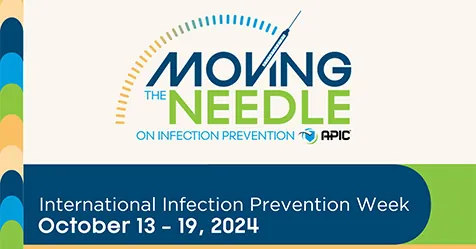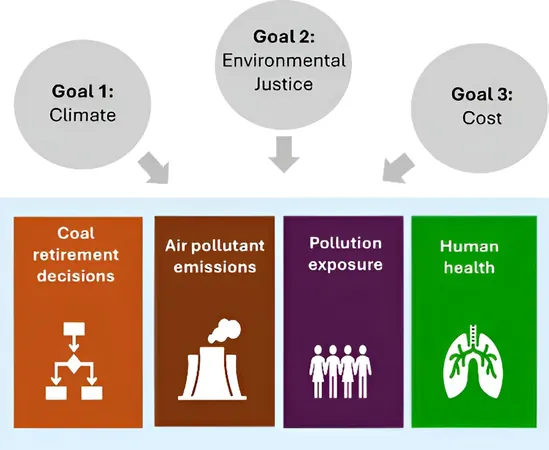
2024 International Infection Prevention Week: A Call to Action Against Antimicrobial Resistance!
2024-10-14
Author: Noah
IIPW Overview
From October 13 to October 19, 2024, the world celebrates International Infection Prevention Week (IIPW), a significant event initially launched in 1986. This year's riveting theme, "Moving the Needle on Infection Prevention," emphasizes how every individual can play a vital role in enhancing community health and safety. The week is a clarion call to illuminate the science of infection prevention, combat rampant misinformation, and inspire future infection preventionists (IPs) to join the ongoing battle against infections.
Organizing Body
Organized by the Association for Professionals in Infection Control and Epidemiology (APIC), IIPW serves as an opportunity for healthcare personnel, patients, and families to honor the dedication and expertise of professionals in the infection prevention field. It is time to acknowledge their unsung heroes who work tirelessly behind the scenes to keep us safe.
Resources for Organizations
To assist organizations in amplifying their infection prevention initiatives, the IIPW website offers a plethora of resources, including a tailored promotion toolkit designed to generate excitement and engagement within healthcare facilities. It’s the perfect time to rally your team and the community around this crucial cause!
The Impact of Vaccination on AMR
In the spirit of this initiative, let’s delve into some eye-opening findings. A groundbreaking report by the World Health Organization (WHO) reveals that vaccines targeting 24 pathogens could slash the global need for antibiotics by an astonishing 22%, which translates to 2.5 billion fewer defined daily doses each year. Despite some vaccines being readily available yet underutilized, others must be developed swiftly to tackle the growing threat of antimicrobial resistance (AMR).
The Crisis of Antimicrobial Resistance
AMR is a dire global health crisis, arising when bacteria, viruses, fungi, and parasites resist antimicrobial treatments. This resistance is largely fueled by the misuse and overprescribing of antibiotics. Shockingly, approximately 5 million deaths annually are linked to AMR worldwide. According to WHO, the administration of vaccines is a crucial part of strategies aimed at mitigating AMR, as they prevent infections, reduce reliance on antimicrobials, and slow down the emergence of drug-resistant strains.
Research Findings
The current WHO report further builds on a study published last year in BMJ Global Health, which estimated that existing vaccines against diseases such as pneumonia, meningitis, and typhoid could avert approximately 106,000 deaths related to AMR annually. Additionally, the development of new vaccines targeting tuberculosis (TB) and Klebsiella pneumoniae could save even more lives—an anticipated 543,000 deaths could be prevented annually with effective rollouts. While TB vaccines are currently under clinical trials, a vaccine for Klebsiella pneumoniae is just beginning its development journey.
The Importance of Prevention
WHO director-general Dr. Tedros Adhanom Ghebreyesus highlighted the importance of these findings, stating, “Addressing antimicrobial resistance starts with preventing infections, and vaccines are among the most potent tools we have for doing that. Prevention is better than cure; thus, increasing access to existing vaccines while developing new ones for critical diseases like tuberculosis is vital for saving lives and combatting AMR effectively.”
Financial Implications of AMR
The financial implications of AMR are staggering as well; the treatment costs associated with resistant pathogens can reach up to $730 billion globally each year. However, the strategic rollout of vaccines could potentially reduce this burden by one-third.
Global Commitment
Rounding out the discussions on AMR, world leaders at the 79th United Nations General Assembly High-Level Meeting, held on September 26, 2024, approved a vital political declaration. This declaration commits to a solid set of targets, including a 10% reduction in the estimated 4.95 million human deaths attributed to bacterial AMR by 2030. This commitment underscores the critical need for improved access to vaccines, medications, and diagnostics while also advocating for innovative funding mechanisms to propel health research and development.
Call to Action
As we observe International Infection Prevention Week this October, let us come together in solidarity and action to stem the tide of AMR. The fight against infections needs to prioritize prevention—every effort counts towards safeguarding our health and the future of global healthcare. Don’t miss out on joining this pivotal movement!









 Brasil (PT)
Brasil (PT)
 Canada (EN)
Canada (EN)
 Chile (ES)
Chile (ES)
 España (ES)
España (ES)
 France (FR)
France (FR)
 Hong Kong (EN)
Hong Kong (EN)
 Italia (IT)
Italia (IT)
 日本 (JA)
日本 (JA)
 Magyarország (HU)
Magyarország (HU)
 Norge (NO)
Norge (NO)
 Polska (PL)
Polska (PL)
 Schweiz (DE)
Schweiz (DE)
 Singapore (EN)
Singapore (EN)
 Sverige (SV)
Sverige (SV)
 Suomi (FI)
Suomi (FI)
 Türkiye (TR)
Türkiye (TR)